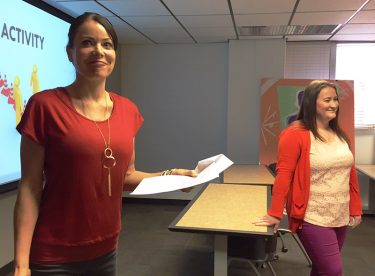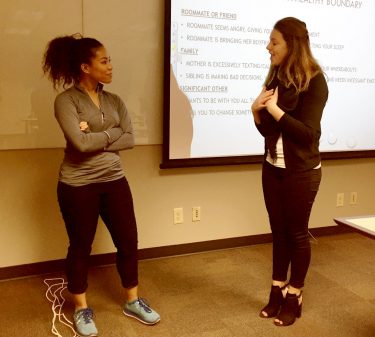Story and photos by Laurie Merrill
GCU News Bureau
Anyone who thinks love is all about candy and flowers has a thing or two to learn about healthy relationships, Dr. Elizabeth Valenti suggested on Valentine's Day.
In the “Tools for a Healthy Relationship” workshop she led during the second day of Mental Health Week at Grand Canyon University, Valenti said that boundaries, conflict-management skills and most important, self-love, are among the key ingredients in a robust partnership.

“You have to love yourself,” said Valenti, a College of Humanities and Social Sciences psychology instructor. “If you don’t like spending time with yourself, who is going to like spending time with you?”
Valenti’s workshop is one of 16 that psychology faculty members are holding during CHSS’s first Mental Health Week, titled “Changing Perspectives: Filter Your Life for Positivity, Peace and Purpose.” Sessions end Thursday.
Other fallacies about love, Valenti said, include:
- Love is all you need.
- You should always put love first.
- Love always will lift you up where you belong.
While love is a part of all our lives, it doesn’t always bring peace and happiness. It can carry the price tag of pain.
The following characteristics can be present in an unhealthy relationship, Valenti said:
- Controlling you with kindness
- Blaming you for your feelings
- Slowly changing you
- Disregarding your goals
- Excessive anger
- A lot of other bad relationships
“If these are here, it could be a problem,” Valenti said.
During one of several brainstorming sessions during the workshop, students listed other unhealthy side effects such as lack of trust, abuse in all its forms, jealousy, manipulation and feeling down.
Boundary setting is essential in relationships, yet many back away from sticking up for themselves, Valenti said, because they lack self-love and don’t even know their boundaries.
She listed the following actions as potential boundary busters, not just from romantic partners but also from acquaintances and friends:
- When someone hugs you tightly the first time you meet
- When an acquaintance touches your hair
- When a friend eats food off your plate
- When you are tagged in a bad photo on Facebook
- When a friend consistently texts you at 3 a.m.
- When your partner requests your social media passwords
- When a partner wants to be with you all the time

"How do these feel in your gut?" Valenti asked.
For some people, it is easier to be uncomfortable than to risk a conflict. Others fear being ridiculed, rejected or abandoned.
If you can’t say no without feeling guilty, can’t talk about your feelings without apologizing and feel as though you are always walking on eggshells, chances are you need to set boundaries, she said.
Sophomores Cierra McDonald and Sarah Jacobson showed the class how to set a boundary and resolve a conflict. The hypothetical issue involved a roommate inviting her boyfriend over every night.
The roommate who was getting awakened told the other how she felt about the unexpected disruptions. The roommate with a boyfriend said she didn't know her friend felt that way and from then on would ask her if it was OK before inviting her boyfriend over.
Valenti, who described herself as a “recovering people pleaser,” said that establishing parameters provides physical and emotional space and eliminates fear and confusion.
Best of all, she said, “It will directly help your self-esteem.”
Remaining Mental Health Week sessions
11:15-11:40 a.m. Thursday
● Mindfulness & Meditation Basics, Saundra Schrock, Building 24, Room 111
● Journaling, for a Peaceful Mind and Wellness, Dr. Laura Terry, Building 24, Room 108
11:45 a.m.-12:10 p.m. Thursday
● Keeping Friends, Making More Friends, Kathy Britton, Building 24, Room 111
● Getting Good Z’s: Sleep Hygiene Habits, Dr. Laurie Tone, Building 24, Room 108
Contact Laurie Merrill at (602) 639-6511 or [email protected].



































































